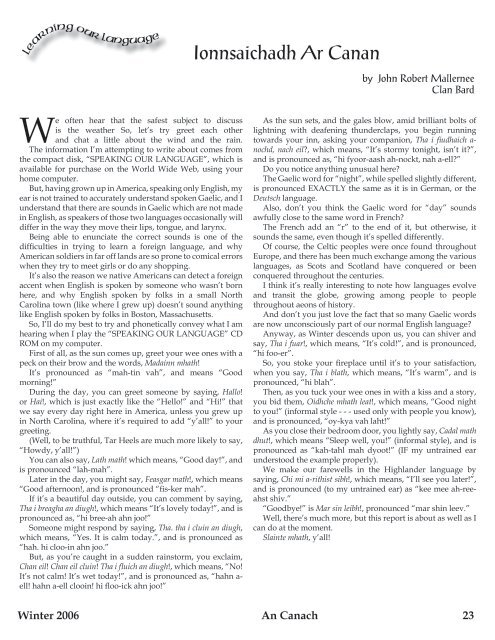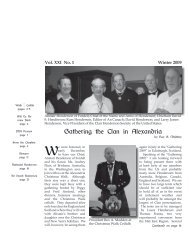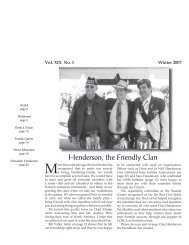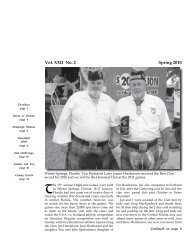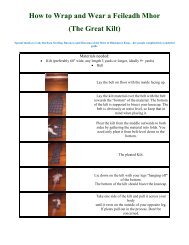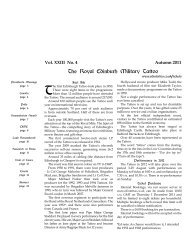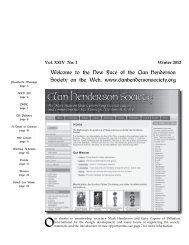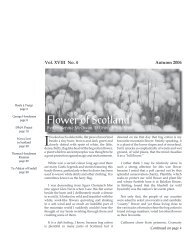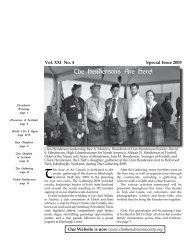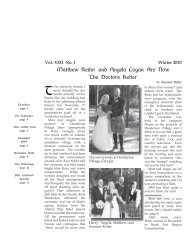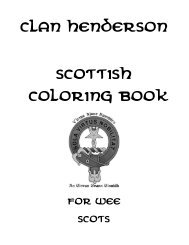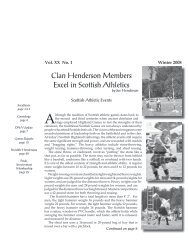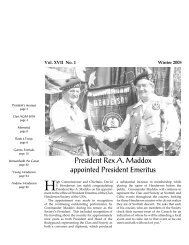The Chief Is Coming - Clan Henderson Society
The Chief Is Coming - Clan Henderson Society
The Chief Is Coming - Clan Henderson Society
You also want an ePaper? Increase the reach of your titles
YUMPU automatically turns print PDFs into web optimized ePapers that Google loves.
Ionnsaichadh Ar Cananby John Robert Mallernee<strong>Clan</strong> BardWe often hear that the safest subject to discussis the weather So, let’s try greet each otherand chat a little about the wind and the rain.<strong>The</strong> information I’m attempting to write about comes fromthe compact disk, “SPEAKING OUR LANGUAGE”, which isavailable for purchase on the World Wide Web, using yourhome computer.But, having grown up in America, speaking only English, myear is not trained to accurately understand spoken Gaelic, and Iunderstand that there are sounds in Gaelic which are not madein English, as speakers of those two languages occasionally willdiffer in the way they move their lips, tongue, and larynx.Being able to enunciate the correct sounds is one of thedifficulties in trying to learn a foreign language, and whyAmerican soldiers in far off lands are so prone to comical errorswhen they try to meet girls or do any shopping.It’s also the reason we native Americans can detect a foreignaccent when English is spoken by someone who wasn’t bornhere, and why English spoken by folks in a small NorthCarolina town (like where I grew up) doesn’t sound anythinglike English spoken by folks in Boston, Massachusetts.So, I’ll do my best to try and phonetically convey what I amhearing when I play the “SPEAKING OUR LANGUAGE” CDROM on my computer.First of all, as the sun comes up, greet your wee ones with apeck on their brow and the words, Madainn mhath!It’s pronounced as “mah-tin vah”, and means “Goodmorning!”During the day, you can greet someone by saying, Hallo!or Hai!, which is just exactly like the “Hello!” and “Hi!” thatwe say every day right here in America, unless you grew upin North Carolina, where it’s required to add “y’all!” to yourgreeting.(Well, to be truthful, Tar Heels are much more likely to say,“Howdy, y’all!”)You can also say, Lath math! which means, “Good day!”, andis pronounced “lah-mah”.Later in the day, you might say, Feasgar math!, which means“Good afternoon!, and is pronounced “fis-ker mah”.If it’s a beautiful day outside, you can comment by saying,Tha i breagha an diugh!, which means “It’s lovely today!”, and ispronounced as, “hi bree-ah ahn joo!”Someone might respond by saying, Tha. tha i cluin an diugh,which means, “Yes. It is calm today.”, and is pronounced as“hah. hi cloo-in ahn joo.”But, as you’re caught in a sudden rainstorm, you exclaim,Chan eil! Chan eil cluin! Tha i fluich an diugh!, which means, “No!It’s not calm! It’s wet today!”, and is pronounced as, “hahn a-ell! hahn a-ell clooin! hi floo-ick ahn joo!”As the sun sets, and the gales blow, amid brilliant bolts oflightning with deafening thunderclaps, you begin runningtowards your inn, asking your companion, Tha i fiudhaich a-nochd, nach eil?, which means, “It’s stormy tonight, isn’t it?”,and is pronounced as, “hi fyoor-aash ah-nockt, nah a-ell?”Do you notice anything unusual here?<strong>The</strong> Gaelic word for “night”, while spelled slightly different,is pronounced EXACTLY the same as it is in German, or theDeutsch language.Also, don’t you think the Gaelic word for “day” soundsawfully close to the same word in French?<strong>The</strong> French add an “r” to the end of it, but otherwise, itsounds the same, even though it’s spelled differently.Of course, the Celtic peoples were once found throughoutEurope, and there has been much exchange among the variouslanguages, as Scots and Scotland have conquered or beenconquered throughout the centuries.I think it’s really interesting to note how languages evolveand transit the globe, growing among people to peoplethroughout aeons of history.And don’t you just love the fact that so many Gaelic wordsare now unconsciously part of our normal English language?Anyway, as Winter descends upon us, you can shiver andsay, Tha i fuar!, which means, “It’s cold!”, and is pronounced,“hi foo-er”.So, you stoke your fireplace until it’s to your satisfaction,when you say, Tha i blath, which means, “It’s warm”, and ispronounced, “hi blah”.<strong>The</strong>n, as you tuck your wee ones in with a kiss and a story,you bid them, Oidhche mhath leat!, which means, “Good nightto you!” (informal style - - - used only with people you know),and is pronounced, “oy-kya vah laht!”As you close their bedroom door, you lightly say, Cadal mathdhut!, which means “Sleep well, you!” (informal style), and ispronounced as “kah-tahl mah dyoot!” (IF my untrained earunderstood the example properly).We make our farewells in the Highlander language bysaying, Chi mi a-rithist sibh!, which means, “I’ll see you later!”,and is pronounced (to my untrained ear) as “kee mee ah-reeahstshiv.”“Goodbye!” is Mar sin leibh!, pronounced “mar shin leev.”Well, there’s much more, but this report is about as well as Ican do at the moment.Slainte mhath, y’all!Winter 2006 An Canach 23


